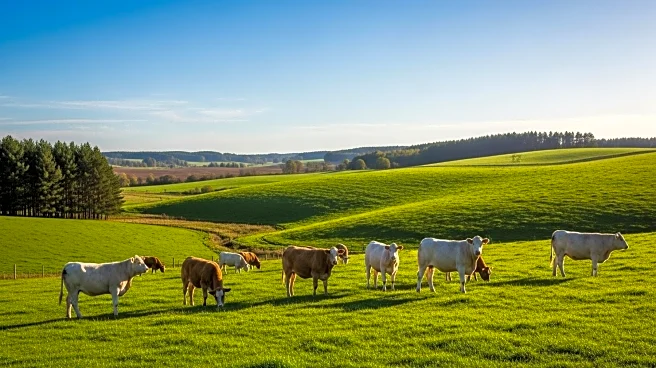What's Happening?
The Thar Foundation, in collaboration with the Sindh Engro Coal Mining Company and other entities, has launched the Livestock Improvement Programme (LIP) in Tharparkar, Pakistan. This initiative aims to enhance livestock productivity through training, research, and capacity building. The programme focuses on empowering women farmers, improving animal health, and increasing rural incomes. It operates across 23 villages, providing training sessions on livestock management and disease prevention. Mobile veterinary clinics have been introduced, and significant vaccination and deworming efforts have been undertaken, benefiting thousands of animals. The programme also promotes breeding interventions and the cultivation of drought-resistant fodder crops.
Why It's Important?
The Livestock Improvement Programme is crucial for the Thar region, where livestock is central to survival and livelihoods. By improving animal health and empowering women farmers, the programme enhances food security and economic resilience. Participating households have reported income increases due to higher milk production and reduced losses. The initiative also supports the establishment of a milk collection system, enabling local milk to reach major cities and generate higher income for communities. This programme addresses chronic feed shortages and strengthens household nutrition, contributing to the overall economic stability of the region.
What's Next?
The programme plans to expand to additional villages, focusing on crossbreeding through Artificial Insemination and building farmer access to credit. It aims to establish structured milk markets to ensure fair pricing and create a regional Livestock Development Centre to enhance breeding programmes. These efforts will further improve livestock productivity and support the development of value-added products, securing brighter futures for families across Tharparkar.
Beyond the Headlines
The initiative highlights the importance of access to knowledge and preventive care in transforming livestock productivity. By empowering women and improving animal health, the programme contributes to gender equality and economic empowerment in rural areas. The focus on indigenous breeds and sustainable practices ensures long-term resilience against environmental challenges, promoting sustainable development in the region.









